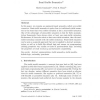Free Online Productivity Tools
i2Speak
i2Symbol
i2OCR
iTex2Img
iWeb2Print
iWeb2Shot
i2Type
iPdf2Split
iPdf2Merge
i2Bopomofo
i2Arabic
i2Style
i2Image
i2PDF
iLatex2Rtf
Sci2ools
104
click to vote
COMMA
2006
2006
Semi-Stable Semantics
In this paper, we examine an argument-based semantics called semi-stable semantics. Semi-stable semantics is quite close to traditional stable semantics in the sense that every stable extension is also a semi-stable extension. One of the advantages of semi-stable semantics is that for finite argumentation frameworks there always exists at least one semi-stable extension. Furthermore, if there also exists at least one stable extension, then the semistable extensions coincide with the stable extensions. Semi-stable semantics can be seen as a general approach that can be applied to abstract argumentation, as well as to fields like default logic and answer set programming, yielding properties very similar to those of paraconsistent logic, including the properties of crash resistancy and backwards compatibility. s: abstract argumentation, stable semantics, stable models, default logic, rationality postulates
COMMA 2006 | COMMA 2008 | Semi-stable Semantics | Stable Extensions | Traditional Stable Semantics |
| Added | 30 Oct 2010 |
| Updated | 30 Oct 2010 |
| Type | Conference |
| Year | 2006 |
| Where | COMMA |
| Authors | Martin Caminada |
Comments (0)

